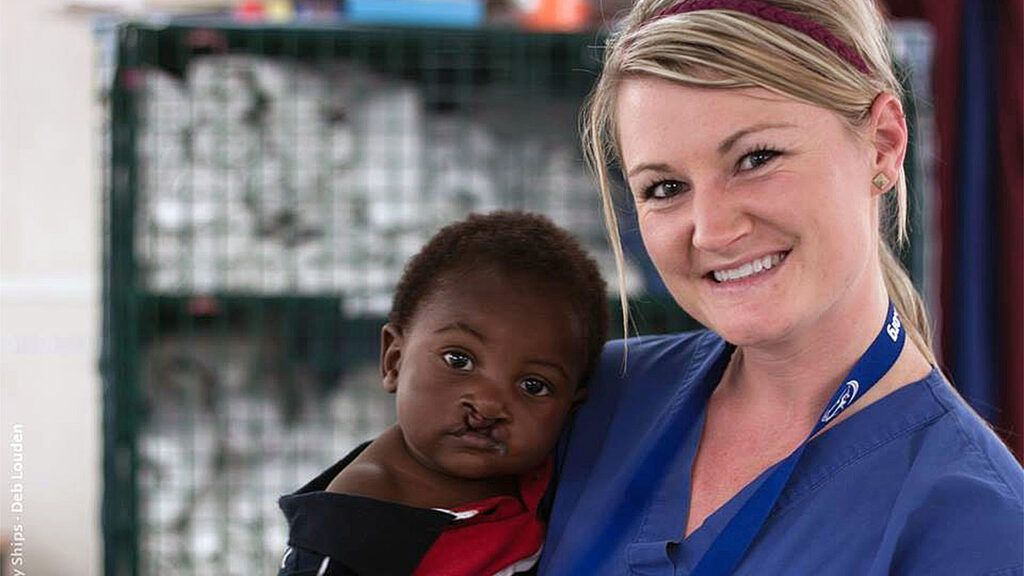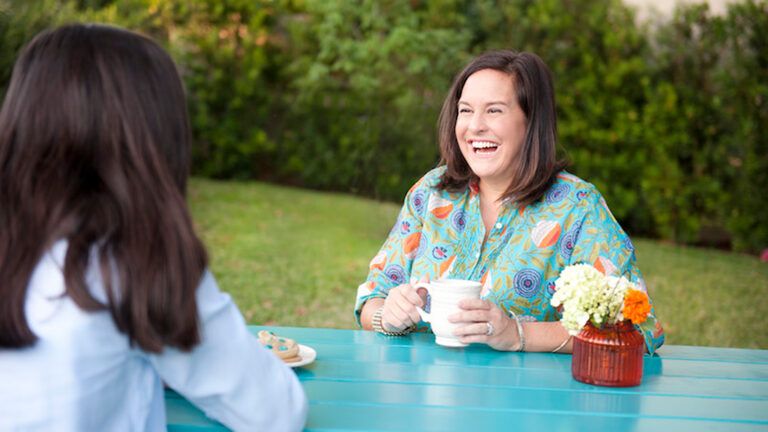Why? I couldn’t stop asking that question. I was a nurse in the maxillofacial ward of a surgical ship docked in the African nation of Madagascar. I had worked on the ship for more than a month, treating patients with facial tumors, cleft lips and other ailments too severe for local hospitals. The job was a dream come true. The ship was operated by Mercy Ships, a global Christian medical charity. I had long yearned to use my nursing skills for God. Now on board the Africa Mercy, I felt as if I had found my calling.
But I’d found something else too. Just a moment ago, I’d been hugging four-year-old Armel. His mother had brought him to the ship seeking treatment for facial tumors. Armel had neurofibromatosis, a genetic condition that causes tumors to form in nerve tissue. The tumors on his forehead and cheek were so large, they covered his right eye.
Armel laughed and ran around the ward like any other child. I loved his antics. But I found it hard to laugh with him. His condition was untreatable. Even after doctors on board removed his tumors, they would eventually grow back. And more would form as he grew older.
Despite the daily success stories, the setbacks weighed on me. The patients we couldn’t help. The children whose pain and disfigurement we couldn’t heal. Even if we successfully treated every one of the thousands of people who came to us during the time we were docked in Madagascar, we would not even scratch the surface of the medical need in this impoverished region of the world. The hope, the sense of call that had brought me to Africa—I felt them draining away.
I watched Armel run to another nurse, smiling and raising his arms to be swung around. Don’t you see him, Jesus? Why can’t we help him? Why?
I never thought I’d be asking such questions when I boarded the plane to Africa from my home in Oregon. I had been consumed with excitement. Certain I was doing what God intended.
I’d wanted to be a nurse ever since I was a child. An old friend from my college days emailed me about Mercy Ships. Launched in 1978, the organization sends fully equipped and staffed medical ships to ports in developing nations. The Africa Mercy, serving coastal Africa, is 500 feet long, with eight decks, a crew of 400 volunteers from 40 nations and four wards that provide surgery and treatment for everything from tumors and malformed limbs to burns and eye diseases.
I was intrigued by my friend’s email but too busy to follow up. I’d been on mission trips before, but I shied away from anything long-term. I grew up in a small town. Portland, Oregon, where I got my first nursing job, seemed way too big and crowded for me—and it’s not exactly a giant metropolis.
And yet, as I settled into a new job in the labor and delivery ward at a small hospital near where I grew up, I found myself thinking about Mercy Ships again. Labor and delivery can be inspiring work—it’s the daily miracle of new life. But sometimes I wondered whether my patients really needed me. We are blessed with so many resources here in America. It didn’t help that friends and siblings began to get married and settle down. I hadn’t found the right person yet. I felt superfluous.
Recalling my old friend’s email one day, I looked up Mercy Ships online. Almost instantly I felt a tug. Resources? Many sick children in Africa have next to none. Superfluous? Every ounce of my skills and compassion would be needed there. Suddenly I knew where I was meant to be. I signed up for a seven-week commitment in Congo.
My certainty only intensified when I came aboard the Africa Mercy. The ship was huge, painted bright white and blue. Inside were the familiar hospital sights and smells. Yet everything felt imbued with urgency and purpose. The crew, volunteers from all over the world, welcomed me. They seemed happy and focused. I dropped my bags in the berth I shared with five other women. And I got to work.
I loved every minute. Before a Mercy Ships vessel docks, advance teams go to regional hospitals encouraging doctors to send the patients they are unable to treat locally. Word spreads and soon thousands are coming to the ship. Each person is screened on shore and sent aboard if the ship can help.
I saw so many people board with tumors, bent over by injuries, nearly blind. After life-saving surgery, they left with new hope. My seven-week posting in Congo flew by, and I volunteered for a longer commitment: 18 months in Tamatave, Madagascar.
I was assigned to the maxillofacial ward, where one of my first patients was a child brought by a young mother. “Tonga soa!” I said to her—“welcome” in the Malagasy language. She regarded me warily, unsure whether I could help her son, who had a severe cleft lip.
I asked if I could hold him and her eyebrows rose, skeptical I really wanted to touch her disfigured child. Through an interpreter, I explained the surgery the child would receive and how we would care for him afterward.
The next day, I stood at the boy’s bedside and watched as his mother gazed down at him after his surgery. “Faly be,” she murmured quietly. “Faly, faly, faly.” I’m so happy, happy, happy.
I could barely contain my joy. And yet, as the initial excitement of my longer assignment wore off, I became more attuned to the reality of health care in Africa. During time off, friends and I would sometimes leave the ship to go to the beach. I was overwhelmed by the poverty I saw. People living in tents. Children begging for food. There were thousands of such children. Millions in Africa.
On board, as I treated more patients, the ratio of happy to unhappy endings seemed to even out. I had probably just overlooked the harder cases earlier. Now they loomed large. Mothers tearful over untreatable children. Wounds that wouldn’t heal. Surgeries that helped but didn’t fix a problem. Why did some people get miracles while others didn’t? Where was God? Sometimes it seemed cruel to help a select few while countless others suffered.
A few days after working with little Armel, I stood in a circle with eight other nurses praying for a patient whose wounds weren’t healing. Four weeks earlier, William had had a large tumor removed from his jaw. The plan had been to replace part of his jaw with a titanium plate and then with a bone graft. But the tumor had turned out to be cancerous, and the presence of cancer meant doctors couldn’t go through with the bone graft. William’s surgical incision remained stubbornly infected. Half of his jaw was permanently gone.
We had been praying for William for a long time. Day after day, he sat with his face in his hands, massaging a headache. It was my job to change his bandages and explain why we had to stop treatment. Even with an interpreter, I couldn’t be sure I was getting through. How do you tell someone with a gaping hole in his face that he will be like that for the rest of his life? Especially when that person came to you confidently expecting an answer to his prayer?
“William, are you discouraged?” I’d asked him a few days earlier. He’d raised his eyebrows resignedly, which I knew meant “yes.”
Now in the prayer circle, I couldn’t help feeling helpless. Bitter, even.
We said amen, and I looked over at William, expecting to see him massaging his relentless headache. Instead, he was reading. With glasses wedged around his bandage, he was gazing intently at his Bible. His face was serene.
I stared. Then reality crashed in like a wave from the sea outside. I had wanted so badly to see William healed physically—to see everyone on board healed—that I had forgotten the myriad ways God was already at work on this ship. I remembered in Scripture how Jesus rarely heals a person’s body without also saying, “Your sins are forgiven.” God’s definition of healing was different, larger than mine.
And here was William, getting to know his true Healer. Who was I to say the care I had shown him was in vain?
I didn’t get to see William discharged— I had been assigned to other patients by then. But I knew God continued to care for him, in ways visible and invisible. Gradually my sense of hopelessness faded. Even if we aboard the Africa Mercy couldn’t cure everyone, we could show God’s love to people who had felt abandoned and alone. We could be part of a larger healing we might never fully understand.
When at last I returned home from Africa, I felt a renewed sense of purpose about nursing, even in the labor and delivery ward of a small-town hospital. Recently, I’ve signed on with another international aid organization to serve a few times each year in places devastated by war or disaster. I just got back from a few weeks in Mosul, Iraq, treating people fleeing that country’s deadly war zone.
In a way, it doesn’t matter where I work. What matters is that I know why I work. I am called to be a nurse. To heal. Most of all, to be God’s hands and heart wherever he sends me. That’s the most important healing of all.
For more inspiring stories, subscribe to Guideposts magazine.





